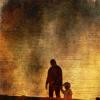I have a prayer.
The most intense week of my life started when I entered a classroom for a one week course. The course was named “Exploring Indigenous Justice and Healing”, taught by Rupert Ross and offered through the Canadian School of Peacebuilding. I had read his book “Returning to the Teachings” a few years before and it had stuck with me. I was excited to hear more as I am in the field of reconciliation and justice.
But I was also nervous because the course was designed to have three full sharing circles. We were really going to get to know each other. Little did I know that I would learn about myself as well.
The first day, Ross asked us to go around in a circle and introduce ourselves. Our first circle--not bad. Some people shared more than others. Then Ross introduced us to how he feels Aboriginal people view and feel the world based on his experiences. This is how I understood his explanation--everything is in relationship. Relationships exist between everything and that relationship is precious and needs to be honoured, protected, and respected. This sounds great and ideal but until you understand how important these relationships are, you cannot understand the traumatic loss experienced by Aboriginal people when these relationships were severed.
Relationships with families were severed through Indian Residential Schools. (These schools were run in the USA as well.)
The relationship to culture was severed through laws, through relocations, and again through residential schools.
The relationship to the land was severed when Aboriginal people were put onto reserves. In the case of my family, the forced relocation caused devastating disconnection on every level.
I realized having no relationships is isolation. This is where I began questioning the impact of these severed relationships...where does it affect my life?
I do not share my mother’s Sayisi Dene culture because she couldn’t share with me something she doesn’t know.
I cannot speak to my mother in her mother tongue as she had no support to teach me.
I do not know any songs or teachings because the dominant culture overshadowed hers.
I can appreciate the beauty of the land, but can I survive and thrive in that land as my grandparents did? While I can learn about the land on my own, I would not have the connection of a grandparent or a parent or an auntie or uncle to teach me. I will never have that precious connection to the land and language through the inherited knowledge of a family member.
This is what I learned about myself in that week long course. I came to realize that I too am isolated--I don’t know any of my Sayisi Dene culture and my relationship to the land has been broken. While my family lived off the land and knew it intimately just fifty years ago, that knowledge has not been passed on to me.
So this is my prayer: Creator, teach us to restore these relationships and forge new ones. Teach us to lift up Aboriginal people and honour their knowledge of the land.
Take the next step: Read the story of Shannon's home community in the book Night Spirits: The Story of the Relocation of the Sayisi Dene or research the story.
[Image: Flickr user Bernat Casero]





The Reformed family is a diverse family with a diverse range of opinions. Not all perspectives expressed on the blog represent the official positions of the Christian Reformed Church. Learn more about this blog, Reformed doctrines, and our diversity policy on our About page.
In order to steward ministry shares well, commenting isn’t available on Do Justice itself because we engage with comments and dialogue in other spaces. To comment on this post, please visit the Christian Reformed Centre for Public Dialogue’s Facebook page (for Canada-specific articles) or the Office of Social Justice’s Facebook page. Alternatively, please email us. We want to hear from you!
Read more about our comment policy.